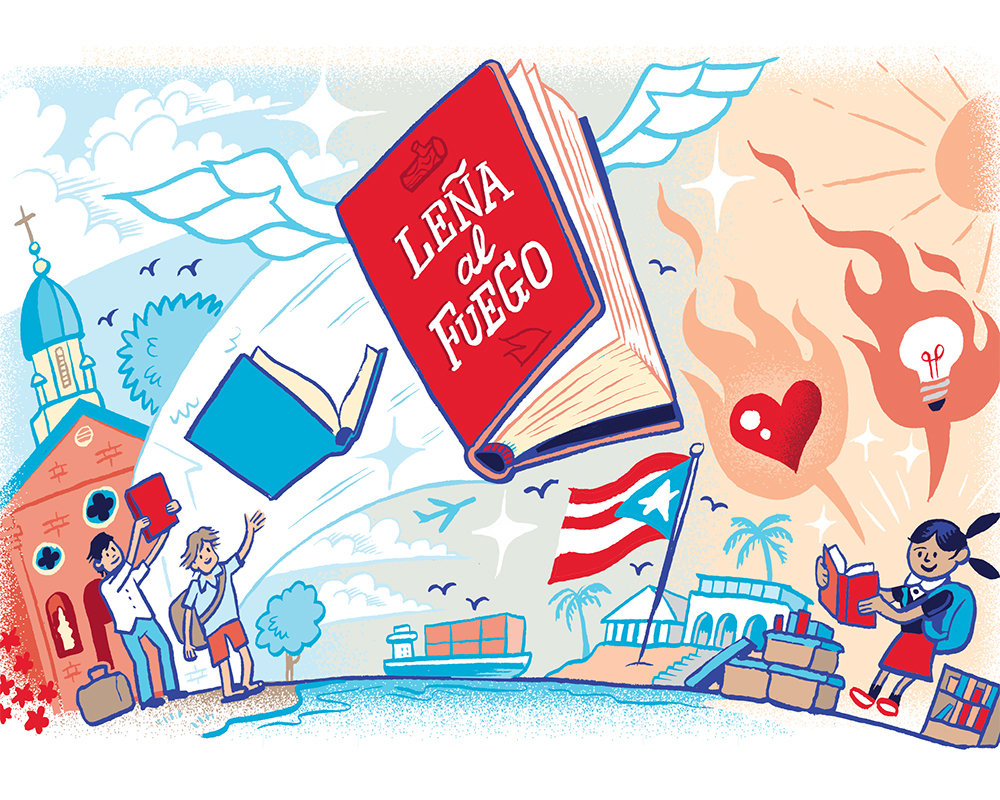Putting wood on the ‘fire’
When he was 18 years old and had few expectations except to experience the world, Eugenio López Matos ’05 boarded a ship with 500 other students to visit nine ports over 100 days.

During the last leg of the trip, after sightseeing and studying the histories of the places they visited, the students arrived in Tanzania where Matos met a group of Congolese refugees. At the end of a long conversation, one of the refugees spoke for the group: “We know you’re leaving for the U.S.; don’t feel bad. We don’t want any money from you, all we want and need from you is a dictionary.”
What they needed, Matos said, was a French to English dictionary that would help the refugees write letters to seek asylum in the U.S. “That was the fire that lit us,” Matos said.
Matos got to work, and one dictionary grew into a library full of books in the refugee settlement. He then spent the rest of his time at UD letting those embers spread, and he did it the Flyer way — while building and working in community.
He connected with Manuel Carro Cruz ’07, who participated in the same study abroad program after hearing about the impact the trip had on Matos. They didn’t know each other before attending UD, but they became fast friends over expanding worldviews gained through traveling and deep commitment to social justice.
“I think traveling is always enlightening,” Carro said. “We decided we need to share [the impact of these experiences] with other students.
“[When] people see what’s out there, that can help change perspectives, and if students decide to take it a step further and do a sustainable development project or one of the immersions at UD, this would be the consequence of the initial step of exploration — breaking out of a bubble and stepping into action.”
In 2023, the Center for Social Concern held an immersion in Puerto Rico — where the two alumni are from and live — to teach about the culture, history and current social justice concerns of the commonwealth. Matos and Carro, through their nonprofit Student Globe Corp., provided an educational immersion for the students. Incorporated in 2005, the nonprofit evolved from a UD campus group called Students for Humanity.
Junior Josefina Carmen Alvarez, a student on the trip, said she was inspired by the pair’s continued literacy advocacy.
“If we don’t educate children now, what is the future?” she said, expressing the impact of the immersion on her expanding worldview. “Sometimes, I feel like life just lines up, and I feel very blessed to have this opportunity and be a voice for these children.”
Since 2004, Carro and Matos have transformed their study abroad service projects to lifelong missions. They have filled libraries in Zambia and Angola, and are now working on their biggest project yet — creating the Student Globe’s Citizens Library in Puerto Rico.
Most libraries on the islands allow public access but the books cannot leave the premises. The Citizens Library will provide onsite access books to be used in circulation physically and digitally.
“UD has resources, yes, but the willingness to make those resources accessible to students … it was transformative."
Part of the inspiration for the library was a result of their previous projects, which required finding, gathering and shipping tons of books. Among them were books on Puerto Rico’s history, culture and life; they will now be available to the islands’ residents.
And it all comes back to Marianist values instilled through their academics and UD experiences.
Matos and Carro both recall University officials supporting their efforts through time and money. They also navigated the challenging logistics and fundraising for the projects as a team with other alumni, including Lawrence Flack ’06, Molly Meehan ’05, Lindsey Badaluco ’05 and Michael Schulz ’07.
“The University of Dayton has played a pivotal role in putting wood to the fire — leña al fuego — very important ones, actually,” Carro said.
Matos described how UD’s call to learn, lead and serve attracted him as a high schooler and still resonates with him today.
“UD has resources, yes, but the willingness to make those resources accessible to students … it was transformative,” Matos said
The transformation of lives extends beyond UD students.
According to Matos, the majority of Congolese refugees he met on his study abroad trip have since found asylum in the U.S., and the Citizens Library launched its online portal in January 2024.
“No me arrepiento, I don’t regret it,” Carro said about their lives of service.
“I believe that if you can leave something for the better, then the children of the children of the children [of today] will be living in a better world.”
Illustration by Dan Zettwoch.